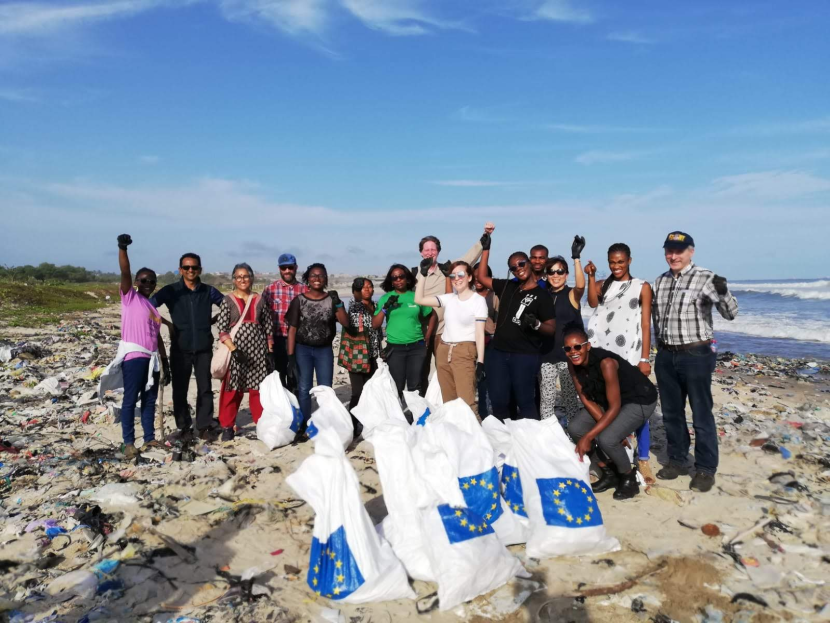
Summary
According to estimates produced by the United Nations Environment Programme, each year human society produces 11.2 billion tons of solid waste. Most of that is produced by people living in urban areas, who by 2050 will account for 70% of the global population and 75% of waste and greenhouse gas emissions. Getting better at managing urban waste is therefore a pressing issue and a global one. A WUN research group led by Professor Shyama V. Ramani (UNU-MERIT and Maastricht University) is undertaking a comparative analysis of ways in which cities can benefit from each others’ experience in tackling the problem. Read more here about their recent workshop at the University of Ghana.
Full story
‘How can we apply policy examples and research insights adopted in our countries or cities of focus, to enhance the sustainable waste management of other cities as well?’ This was the question that Professor Shyama V. Ramani (United Nations University–Maastricht Economic and Social Research Institute on Innovation and Technology and Maastricht University) posed to participants in the Worldwide Universities Network research group on urban waste management.
In many countries across the world catastrophic levels of waste are having major impacts on health, the environment, and the economy. Policy-makers have been slow to catch up to the health impacts of poor sanitation, according to the World Bank’s Water and Sanitation Program. Even in 2012, about 16 million Ghanaians were using unsanitary or shared latrines, according to the WSP. Approximately 19,000 Ghanaians die each year from diarrhoea related to poor hygiene and sanitation, and this burden falls most heavily on the poorest.
Members of the WUN group went to Accra in November 2019 to meet with stakeholders from academia, government, civil society and industry in Ghana, Uganda and South Africa. Their aim was not to propose solutions but rather to get to grips with the multi-faceted challenges of waste management in Africa. Addressing them will require the researchers, whose understandings have been shaped by a range of geographical contexts, to be familiar with the realities facing countries like Ghana that have fast-growing, emerging economies.
To this end, the group undertook site visits with the support of two non-academic partners, who also participated in the workshop that followed. With GIZ Ghana, the scholars went first to Agbogbloshie. A former wetland site, Agbogbloshie combines a slum, a scrapyard, and a household waste dump, its burn-offs releasing toxic chemicals with drastic effects on health, which GIZ is trying to transform. The second site visit was a beach-cleaning session guided by the environmental organisation Plastic Punch.
As Ms Maria Tomai explained, these visits were instrumental because they ‘brought us in touch with the real dimensions of this societal challenge, faced by the vast majority of cities in the developing countries.’ A PhD student at UNU-MERIT, Tomai’s research is on how cities can transition towards circular economies, using case studies in Accra, Athens, and Maastricht, looking at policies and behaviour change.
The event in Ghana reflects the innovative approach that the group’s collaborators have developed through the SITE4Society initiative, founded by Ramani in 2017 and based at UNU-MERIT. SITE4Society promotes ‘action research’, putting study in service of positive change. Its name reflects its focus on science, innovation, infrastructure, technology, and engagement—furthering the objective of meeting the Sustainable Development Goals.
Within this structure, Ramani also used the Accra meeting to test ways of disrupting established formulae. She handed the final, concluding session over to student volunteers who were asked to apply the SITE framework to the presentations they had just heard. It was, she noted with pleasure, a great success: ‘the students not only understood the framework, but they brought fresh insights on the presentations by the WUN partners. In short, they brought the house down!’
—
Professor Shyama V. Ramani is Principal Investigator of the Urban Solid Waste Management group. Its WUN partner institutions are Maastricht University, University College Dublin, the University of Ghana, the University of York. For more information see their WUN page.